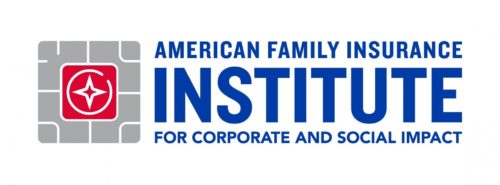
This article appears as part of This Week in Milwaukee Rising, a weekly newsletter from Technical.ly highlighting the innovators bringing a more just, equitable and dynamic Milwaukee economy. Subscribe here. The series is underwritten by American Family Insurance Institute for Corporate and Social Impact.
For Rebecca Stoner, the fight for Milwaukee’s parks is the fight for our collective wellbeing.
In 2021, Stoner took on the title of executive director at the Milwaukee Parks Foundation, founded just a year before with the goal of engaging Milwaukee and its residents to support the struggling county parks system.
Stoner originally planned to be a doctor. After growing up in North Carolina, Stoner took classes like molecular biology and chemistry at the University of Illinois-Urbana Champaign throughout her undergrad. She even went pre-med for a couple years before she discovered her love for being a part of solutions-based work.
After her undergrad, Stoner worked with men exiting homelessness for a year, inspiring a passion for social service, so she enrolled in Marquette University’s master’s in public service program. In the years following, she held a number of service-focused roles in organizations focusing on social challenges such as homelessness and housing.
“I started really falling in love with Milwaukee’s different neighborhoods and realizing that, from block to block, the city looks really different,” Stoner told Technical.ly. “And part of that is obviously the negative repercussions of systemic racism and segregation, but a part of that is also the beautiful, amazing people.”
The state of public parks
In her position at the Milwaukee Parks Foundation, Stoner finds joy in discovering the diverse neighborhoods of the city, but she also confronts the challenges facing Milwaukee County parks on a daily basis. The big one: The parks system is not a mandated service of the county. Per Stoner, the dollars the county accrues are spent in other areas, and whatever is left over is what goes to the parks.
According to the American Society of Civic Engineers’ 2021 Infrastructure Report Card, Milwaukee County is not alone. Although interest in local parks has increased, the investment is lagging, resulting in deferred maintenance backlogs and deteriorated parks facilities across the country.
“If you look at the trends, if nothing changes by 2027, there will be no local tax dollars left for our parks, meaning the only things that can sustain our parks are the revenue-generating pieces,” Stoner said of Milwaukee — “which defeats the purpose of a park system that is supposed to be free and accessible recreation for everyone.”
A report issued by the Wisconsin Policy Forum in October 2021 found that while the county should be spending $39 million per year for park repairs “based on current needs,” parks received an average of just $9.6 million per year over the past five years. The same report confirms Stoner’s statement and predicts that without tax dollars, the parks system would be dismantled.
Milwaukee County Parks has been facing these budget cuts year after year, and the socioeconomic gaps from neighborhood to neighborhood have become increasingly evident. Communities that have the resources and affluence are able to take care of their parks thanks to some dedicated friends groups who have been successful at fundraising, Stoner said. Because they are able to bring more resources to the table, they can complete more projects in their parks. In other areas, such a fundraising system has not been set up yet, and as a result, the parks system has become inequitable: Some parks are top of the line, and some need serious investment.
Stoner hopes her work at the Milwaukee Parks Foundation will motivate Milwaukeeans to collectively steward a thriving park system. She believes that the parks are for everyone, and that an indicator of a job well done is when the neighborhood residents feel an ownership connection to their parks. Parks serve as the setting for birthday parties and picnics, but they are also often symbols of divestment, crime and infrastructure challenges. For her, the parks system is a kind of “microcosm of our greater system as a whole” — a socioeconomic barometer.
“[Parks] are an indicator of our collective health,” she said. “When the parks are doing really well, neighborhoods do really well. Housing prices go up, people feel safe and like they belong. It just has this really incredible ripple effect.”
Public service for collective strength
The more Stoner learned about the dire position the Milwaukee parks are in, the more passionate she became. The most difficult aspect of her work at the Milwaukee Parks Foundation is knowing that lasting change will take time: Milwaukee County, while it does a lot of good, is still a bureaucracy. Short-term solutions are required to ensure that the parks remain vibrant and busy, but the parks system needs sustainable solutions. Stoner wants to take each step slowly and intentionally to make sure they are building the parks system up with equity, putting the people first.
Throughout her career in public service, Stoner said she’s learned that the idealized rugged American individualism — the concept of seeking and working for individual success — is overrated. She is adamant that she has been made stronger, smarter and better by the people around her.
“Being a part of something greater than yourself is the best,” she said — “the best thing I can bring to this world.”
Subscribe to This Week in Milwaukee Rising:
Join the conversation!
Find news, events, jobs and people who share your interests on Technical.ly's open community Slack

Delaware daily roundup: Delmarva Power vendor stats; DelDOT's $15M federal grant; 50 best companies to work for

Delaware daily roundup: Over 4,000 Black-owned businesses uncovered; Dover makes rising cities list; a push for online sports betting

Philly daily roundup: East Market coworking; Temple's $2.5M engineering donation; WITS spring summit


